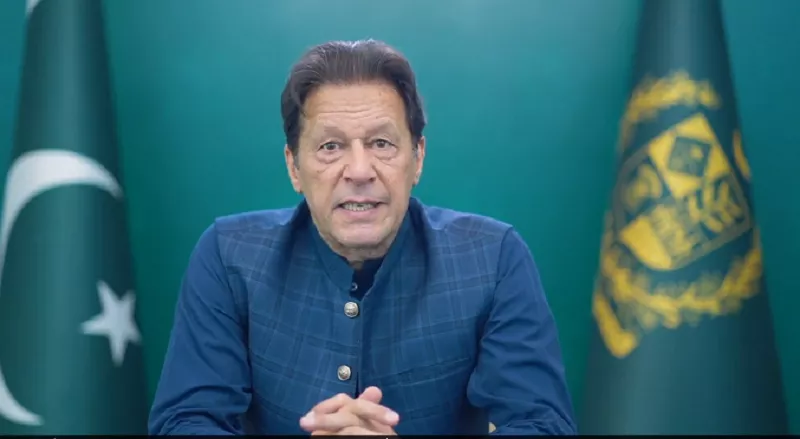PM repeats call for joint global fight against Covid
Imran urges equitable vaccine supply, reallocation of IMF quotas by rich states to poor nations
Prime Minister Imran Khan called on Tuesday for a joint global action to fight the triple challenges posed by coronavirus pandemic through equitable vaccine supply, reallocation of International Monetary Fund (IMF) quotas by high-income states to the poor nations and adaptation of climate finance.
In a virtual address to the UN High-Level Political Forum (HLPF) on Sustainable Development, held at the UN Headquarters in New York, Imran articulated his vision for dealing with the challenges of Covid-19 pandemic, revival of economic activities and dealing with the existential threat posed by climate change.
Also read: PM Imran slams 'vaccine nationalism' at ECOSOC forum
Imran stressed that the “universal and affordable access to Covid-19 vaccine was vital to defeat the virus and to revive global trade, investment and growth”. He added that the global economy would not recover fully until all countries were enabled to accelerate and expand investment.
In a wide-ranging speech, the prime minister suggested measures for an effective response to ‘build back better’ after the pandemic. He stressed that the world must ramp up vaccine production, including in the developing countries, and ensure its rapid distribution.
In order to enable developing countries to purchase vaccines at fair prices, he emphasised on waiver of intellectual property rights even if temporary, vaccine production under licence, full funding of COVAX facility, and grants and concessional lending.
“Adequate finance is important to mobilise the developing countries meet the triple challenge of Covid recovery, implementation of Sustainable Development Goals (SDGs) and realisation of environmental goals,” he said.
Imran pointed out that high-income countries injected $17 trillion to stimulate their economies while the developing countries needed at least $4.3 trillion to recover from the crises and implement the SDGs. “They have so far unfortunately secured access to less than 5% of this amount,” he added.
Welcoming the agreement to create new IMF Special Drawing Rights (SDRs) worth $650 billion, the prime minister endorsed the proposal of the IMF director general to enable the high-income countries to voluntarily reallocate a part of their unutilised IMF quotas, and stressed its urgent approval.
The prime minister expressed the hope that at least $150 billion would be reallocated to finance sustainable development projects and programmes in developing countries through the IMF, World Bank and other development banks and institutions.
“The restructuring of high-cost debt is another instrument to provide fiscal space and development finance for the affected developing countries,” he said and pointed out that any “common framework” for debt restructuring should not involve protracted negotiations that could defeat the purpose of relief.
Imran emphasised the need for fulfilment of the commitments made to provide concessional and grant finance to the developing countries, including the 0.7 percent Official Development Assistance (ODA) commitment, and the advanced IDA-20 window of $50 billion.
“Similarly, fulfilment of the commitment made by developed countries to provide $100 billion per year in climate finance is vital, including for the success of the COP-26 [the 2021 United Nations Climate Change Conference], in Glasgow,” he stressed.
Imran mentioned that the accumulated climate finance commitment now amounted to over $1 trillion, adding that the amounts offered for development cooperation, including ODA, could not be double-counted as part of the climate finance commitment.
He stressed that at least, 50 per cent of the climate finance should be allocated for adaptation. “It would enable developing countries to implement their climate commitments in accordance with the principle of common but differentiated responsibilities,” he added.
He called upon the countries to focus in their national and international development strategies on the target sectors including Covid recovery, human development, social protection, renewable energy, sustainable agriculture, climate change and digitalisation.
He urged the UN to initiate a multi-stakeholder dialogue to mobilise the $1 trillion investment required annually in sustainable infrastructure besides attracting public and private investment through its SDG Investment Fair.
Also read: PM Imran reiterates support to Chinese leadership to safeguard world peace, progress
Imran said that protectionist measures erected by some major economies in violation of the WTO agreements needed to be rescinded to check illicit finance flowing out of the developing countries must be halted.
Endorsing the 14 recommendations of the Financial Accountability, Transparency & Integrity (Facti) Panel, he welcomed the proposal of the United States for a minimum global corporate tax to prevent profit shifting and tax evasion.
The HLPF is convened every year under the auspices of the UN Economic and Social Council (Ecosoc) – which is currently presided over by Ambassador Munir Akram of Pakistan. The forum discusses the policies that have been implemented so far to respond to the pandemic and its impacts.


COMMENTS
Comments are moderated and generally will be posted if they are on-topic and not abusive.
For more information, please see our Comments FAQ